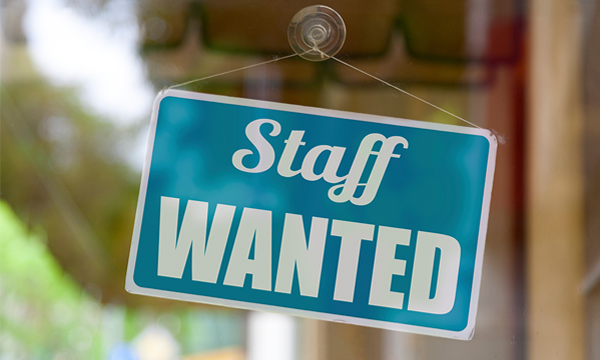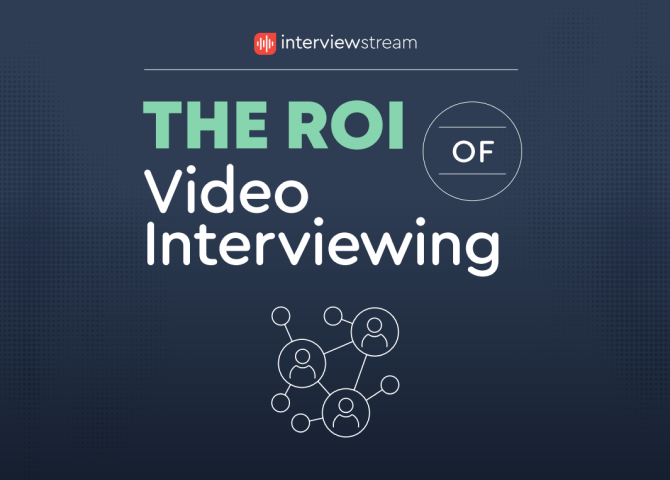Hiring in Retail: How to Make Your Recruitment Process More Agile

The rundown
- In the space of a few years, retail recruiters have gone from managing massive volumes of candidates to trying to beat out competitors to hire the few candidates on the market.
- Post-pandemic, the customer experience has changed. Customers look for store attendees that can help solve their issues, not cashiers to help them check out.
- Resilient retail recruiters will adapt their ideal candidate to the level of customer expectation, looking for candidates based on personality and attitude rather than experience.
- Having a seamless tech stack helps to make your recruitment process more efficient for both recruiter and candidate, and provides a better candidate experience for those who apply.
Table of contents
- The State of Hiring in Retail
- The New Role of the Retail Worker
- How You Can Hire + Retain Retail Employees
- How To Find Your Ideal Candidate
- Your Retail Tech Stack
- About interviewstream
The State of Hiring in Retail
Hiring in retail has shifted dramatically post-pandemic. With employees unavailable or unwilling to return to work, many retail chains have had to advertise higher pay and better benefits. Retail recruiters are used to managing high volumes of candidates and weeding out the best, but now they must make do with the trickle of applicants coming through. Recruiters that are succeeding in finding enough candidates to fill their stores and provide great customer service to their clients are those who have been most agile.
The New Role of the Retail Worker
The entire retail industry had to pivot hard at the beginning of COVID-19. With worldwide restrictions on when and if people could leave their homes, more buyers turned to e-commerce and avoided brick-and-mortar stores. This caused a corresponding shift in work tasks from managing the cash register and check out to packaging orders and coordinating customer support online.
Even now, there is less need for check-out lines to be manned by store clerks. The customer experience has changed and so have customer expectations. Your client doesn’t need a cashier chatting with them about their day – they need a knowledgeable clerk to help them when they have a question. Customer satisfaction is tied to customer experience – so hire employees who are going to give your clients the best experience possible.
“Hiring managers are learning to work with the labor market by hiring for soft skills and training for experience“
Customer experience relies more heavily on interactions than technical expertise (although – this comes with a caveat – if you’re shopping at Hermès, you expect the representative to know fashion). So the best hiring decision you can make is to hire for skills and train for experience. Can your new store associate learn about fashion? Yes. Will they be able to learn patience? Unlikely.
Interested in our HR newsletter? Sign up below!
Sign up for our newsletter – we send out a newsletter email two to four times a year which includes HR trends, industry-relevant knowledge, and the latest interviewing tips for recruiters and candidates.
How You Can Hire + Retain Retail Employees
Retail recruiters have started emphasizing more and more the need to hire quickly. The rallying cry is: shorten time-to-hire, time-to-offer, applications, etc. Which makes a lot of sense, as candidates are often applying to multiple places at once and might jump at the first offer they get. However, by narrowing your lens and focusing on this one piece of the puzzle, you could be recruiting the wrong type of candidates.
Time-to-hire is an important hiring metric, but equally important is choosing a candidate who will fit in with your company culture and the work pace of retail. Hiring anyone with a pulse that wants to work in your store would be a mistake. So – how do you find your ideal candidate? We can help!
How To Find Your Ideal Candidate
Step 1: Define your ideal candidate
Think about what makes your top employees so amazing. Is it their personality, experience, or know-how? If you answered (D) – all of the above, you are correct! Answer the following questions to get a comprehensive list of the qualities you seek in a new employee. Keep in mind that these questions are a starting point. You may have other requisites for your employees (whether or not they are a brand advocate or how flexible their schedule is, for example), but using these 4 questions you can flesh out what a star candidate looks like.
- What personality traits do they have?
- What type of experience?
- What technical knowledge?
- What are their soft skills & hard skills?
Step 2: Refine this list
Now you have a list of traits outlining your ideal candidate. Let’s be honest – no one is going to have every single bullet point on your list. So your next step is to decide what is absolutely necessary for an employee to have so that they are an asset to your store or brand. For every store, this answer will be slightly different, but most retailers say that a friendly, patient candidate with a bit of experience or technical knowledge would be a great retail associate. As we mentioned before, hire for the soft skills (friendliness, patience, calm demeanor) and train for the rest. Once you are done refining this list, move on to creating screening interviews.
Step 3: Creating your screening interview
When creating your screening interview (and further interviews, if you have a multi-step process), make sure you are choosing questions that tell you whether or not your candidate has your ideal candidate values. It’s commonplace to ask about their experience, but if experience didn’t make it onto the list, try to roll it into another question. Think – “Tell me about yourself”. Ask every interviewee the same questions so you get a calibrated sense of how one is doing in relation to the other.
But – how exactly are you doing your interview? It’s common to do interviews in the store, but as one of the most highly valued aspects of retail is the flexibility, so why not show flexibility by screening your candidates through one-way video interviews. Candidates can complete their interviews at whatever time works for them and you have much more flexibility in deciding when to review. We know we said time-to-hire isn’t the most important metric to measure for retail hiring – but it is nice to get a bit of time back.
Step 4: Onboarding + Employee Experience
A strong onboarding process can improve retention by 82%… so hop on board. Onboarding is partly explaining processes, policies, and procedures and partly getting comfortable and getting to know teammates. Typically, retail positions ramp up quickly, but it is worthwhile to devote a week or two to onboarding your new employee. After the initial onboarding period, set times to meet to continue developing your store personnel and to foster a sense of community.
“Candidate experience” is a phrase that has been popping up more often in hiring circles, but equally important is employee experience. If you are transparent, flexible, and communicative with your candidate – don’t stop once they’ve become your employee. They joined your company because your culture resonated with them, so keep reinforcing the culture.
Your Retail Tech Stack
We could write a whole article about the technology you can use to help you recruit, but we’re just going to go over the basics here. 83% of retailers are investing more heavily in recruiting and retaining employees – so don’t fall behind. Technology is essential to modern recruitment, especially for companies that need to hire many employees at once. So, here is our list of essential recruiter tools.
- An ATS (or Applicant Tracking System) is non-negotiable for volume hiring. It also serves as the pillar of your recruitment process and most likely will integrate with various other platforms to make your hiring easier.
- Sourcing tools. Most of these tools use AI to comb job boards and social media for candidates with your criteria. They can speed up the hiring process by letting you know when applicants are online.
- A candidate screening tool. Video interviews help you screen candidates 80% faster than in-person interviews. They help lessen the burden on recruiters and provide a better candidate experience.
- An onboarding/employee benefits platform. Again, these platforms reduce HR hours devoted to repetitive tasks – like automating new hire paperwork. As a bonus, your new employee will be able to view pay stubs, benefits, and more.
Want to learn more about video interviewing?
Chat with a client success expert today and learn how to leverage remote interviewing solutions to simplify and personalize your hiring practices.
About interviewstream
interviewstream is an industry leading recruiting software company that helps you reach your top candidates more effectively. Our customers have completed over 3 million interviews using interview builder, interview on demand, interview scheduler, interview connect – and we’d love to help you as well. Talk to an expert today to learn how to get started.
Want a PDF version of this eBook?
Fill out the form below to get a PDF version of this eBook.
The interviewstream platform
Speak to an expert today to learn how our remote interviewing solutions make hiring more effective.
About interviewstream
As companies transition to remote work, we exists to help recruiters and hiring teams ask the right questions every time, screen candidates faster, make scheduling easier and reach candidates everywhere. Using our remote interviewing platform, your team will have a complete view of the candidate in one location while also leveraging one of the leading platforms for online interviewing.
Related Content

Hiring for Retail E-Commerce or Brick-and-Mortar Positions? Here’s What to Look for in Candidates


